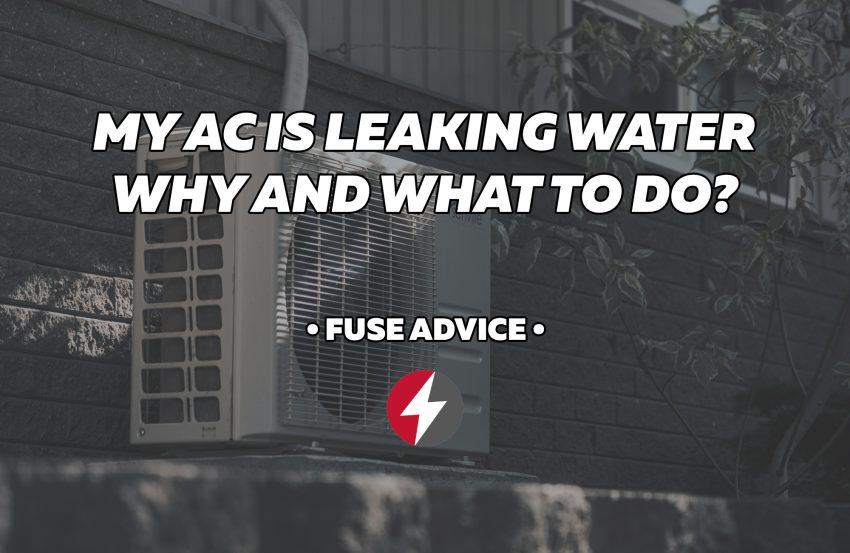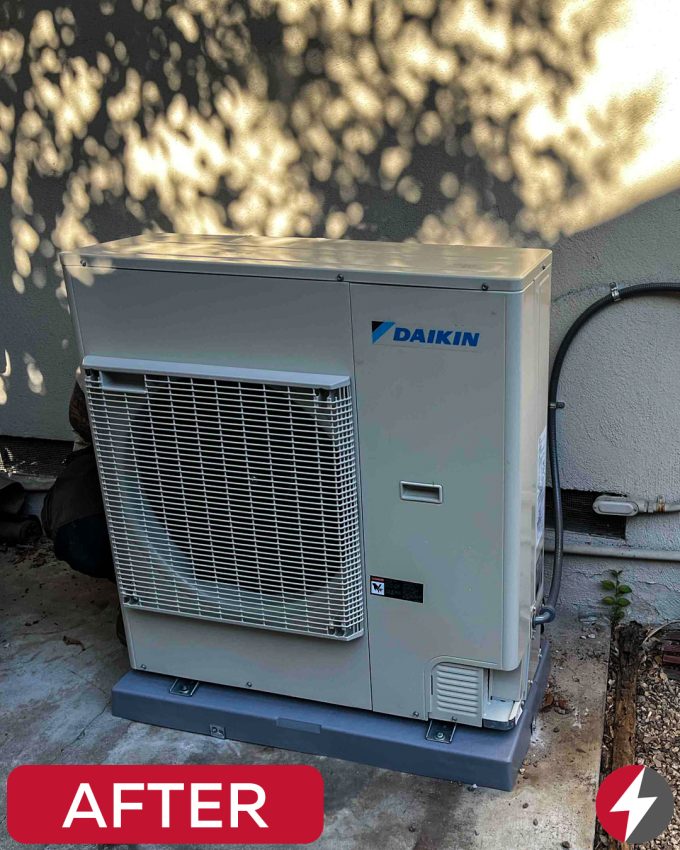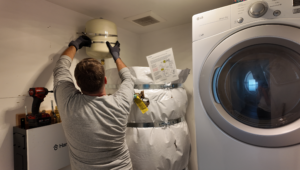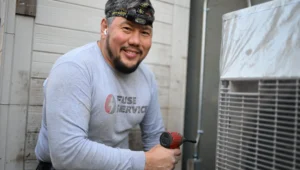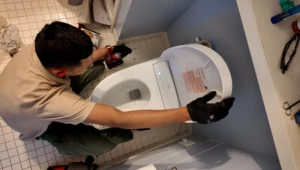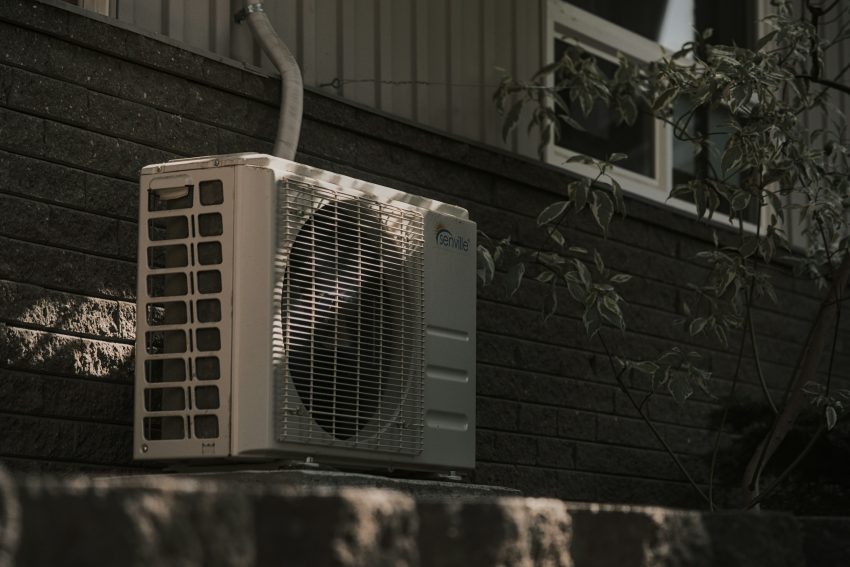
Air conditioners are irreplaceable for many homes, particularly in places where the heat can become unbearable. So, when your mighty AC starts leaking water, it can be really scary. Water from an air conditioner can be a sign of different issues that require your attention. In this article, we’ll discuss the reasons behind AC water leaks, the potential damage they can cause, and what steps to take when your air conditioner starts leaking.
Understanding How Air Conditioners Work
To better understand why water leaks from an AC, it helps to first understand how the system works. Air conditioners don’t just cool the air; they also remove moisture from it. This process, known as dehumidification, is key to why AC units may leak water. The warm air inside your home passes over the evaporator coil within the AC unit. As the air cools, it condenses into water droplets, which collect on the coil. These droplets then drip into a drain pan, where they are funneled through a drain line and expelled outside. Under normal circumstances, this process goes without interruption, and you should never notice water inside your home. However, when something goes wrong, water can start leaking, and the problem needs immediate attention.
Common Reasons Why Air Conditioners Leak Water
Several factors can cause your air conditioner to leak water. Here are the most common reasons:
Clogged Drain Line
One of the most common causes of AC water leaks is a clogged drain line. Over time, dust, dirt, and debris can gather in the drain line and it will block the flow of water. When this happens, the water that has nowhere to go may start pooling around the air conditioner, eventually leaking out of the unit. Professional HVAC technicians can solve this problem with the special tools and expertise they have.
Frozen Evaporator Coil
The coil can freeze due to restricted airflow, a dirty air filter, or low refrigerant levels which will be discussed further. When the coil melts, the excess water may overflow the drain pan. This issue should be only addressed by a qualified technician who can identify the root cause of the coil freezing and take the appropriate measures.
Cracked or Damaged Drain Pan
As we already said, drain pan collects the water that condenses on the evaporator coil. Over time, this pan can become cracked or corroded. When this happens, the water that should be collected will leak out of the pan and possibly into your home. Replacing or repairing a damaged drain pan is a task for an HVAC professional, as it requires specialized knowledge of the system’s components.
Improper Installation
If your air conditioner was not installed correctly from the beginning, it might not be level, which can cause water to pool and leak. This is especially true for window air conditioners. To check whether your AC was installed correctly, you should call a professoinal.
Dirty or Blocked Air Filters
Dirty filters restrict airflow. When the coil eventually thaws, it can cause water to overflow the drain pan and leak. Regular maintenance, including changing or cleaning filters, can help prevent this issue.
Low Refrigerant Levels
When refrigerant in the AC finishes, it can cause an overall system malfunction. And not only that—low refrigerant also poses an environmental hazard. Handling refrigerant is totally not a DIY task, a licensed technician should always be called to handle refrigerant issues.
What to Do When Your Air Conditioner Is Leaking Water
Once you’ve noticed water leaking from your air conditioner, it’s important to do something quickly to prevent further damage. Here’s what to do:
Turn Off the Air Conditioner
If you notice water pooling around your air conditioner, the first step is to turn it off (yes, we know it might be painful). Continuing to run the system can worsen the problem, particularly if the leak is due to a frozen coil or clogged drain line. If you shut off the unit you also prevent the risk of electrical hazards.
Call a Professional HVAC Technician
Water leaks in air conditioning systems are typically a sign of a more complex issue that requires a trained eye. Calling a licensed HVAC technician is the safest and most effective way to address the issue. Professionals have the tools and expertise to diagnose the cause of the leak and do the necessary repairs or maintenance.
Consider Regular Maintenance Plans
One of the best ways to prevent water leaks and other issues with your air conditioner in advance is to get a regular maintenance plan. HVAC professionals offer maintenance services that include inspecting, cleaning, and servicing your system. This way you can catch small problems before they escalate.
When to Replace Your Air Conditioner
Water leaks form the AC that just don’t seem to end can indicate that your air conditioner is too old. The systems that approach 10-15 years old are more likely to break down and may no longer operate efficiently. If your AC is leaking too often or requires any other constant repairs, it might be more cost-effective to invest in a new system. A professional HVAC technician can help you determine whether repair or replacement is the better option for your situation.
Conclusion
When your air conditioner starts leaking water, it’s of the utmost importance not to ignore the problem or attempt DIY repairs. Water leaks are often a symptom of a deeper issue, such as a clogged drain line, frozen evaporator coil, or refrigerant problem, all of which require professional intervention. In the case of leak you should turn off the unit and call an HVAC technician promptly. Regular maintenance is also key to avoiding leaks and extending the lifespan of your AC unit—call us today to learn more about our maintenance plans. We are available at (408) 898-1576 or support@fuseservice.com!
